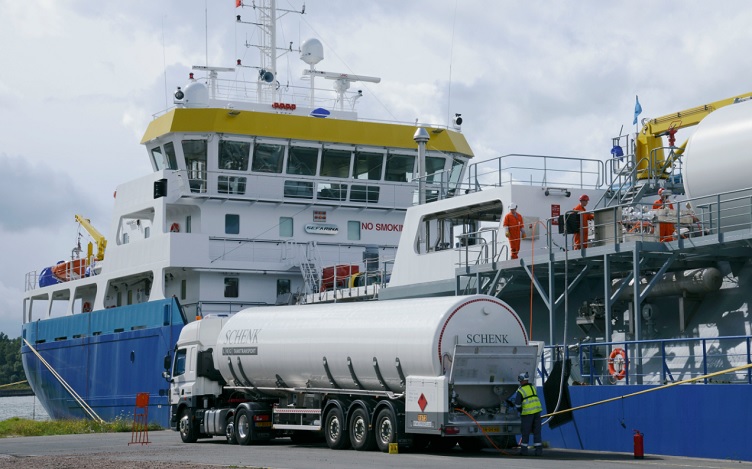LNG Bunkering Solutions in Nigeria – Enabling Cleaner Marine Fuel Supply for the Future
As the global maritime industry shifts toward cleaner, low-emission fuels, liquefied natural gas (LNG) has emerged as a leading alternative to traditional heavy fuel oil. Nigeria, with its vast natural gas reserves and growing port infrastructure, is well-positioned to become a regional hub for LNG bunkering.
This article explores the opportunities and challenges of LNG bunkering solutions in Nigeria, the role of regulatory support, and how Wigmore Trading assists stakeholders in sourcing LNG equipment and supporting the logistics of safe and efficient LNG fuel supply.
Why LNG Bunkering Matters
LNG offers several benefits over conventional marine fuels:
-
Up to 20% lower CO₂ emissions
-
Almost zero sulfur and particulate matter
-
Reduced NOx emissions by up to 85%
-
Compliant with IMO 2020 Sulfur Cap and MARPOL Annex VI
With increasing demand from shipping lines looking to decarbonize their operations, Nigeria has the strategic advantage of offering LNG bunkering along major West African shipping routes.
The State of LNG Infrastructure in Nigeria
Nigeria is already a global exporter of LNG through Nigeria LNG (NLNG) in Bonny Island. However, domestic use of LNG as marine fuel is still in the early stages.
Key Potential Bunkering Locations:
-
Lagos Port Complex (Apapa & Tin Can Island)
-
Onne and Port Harcourt Ports
-
Bonny Island (home to NLNG plant)
-
Lekki Deep Sea Port (under development)
Current Developments:
-
Pilot LNG bunkering projects are under discussion between NIMASA, NLNG, and private operators.
-
Regulatory frameworks for gas-powered vessel refueling are being drafted.
-
Interest is rising in hybrid LNG-powered vessels for coastal shipping and offshore support roles.
Regulatory and Safety Considerations
LNG bunkering requires adherence to strict safety, environmental, and operational guidelines:
-
International Standards: ISO 20519 for LNG bunkering operations, SIGTTO guidance, and IGC Code compliance.
-
Nigerian Regulations: NIMASA and DPR (now NUPRC) are key stakeholders in approving LNG infrastructure, vessel modifications, and operational safety.
-
Permit Requirements: Approvals for shore-based LNG bunkering, ship-to-ship (STS) transfers, and floating bunkering units.
Types of LNG Bunkering Methods
-
Truck-to-Ship (TTS): LNG is delivered via cryogenic tanker trucks to vessels at berth.
-
Ship-to-Ship (STS): LNG is transferred from a bunkering vessel to the receiving ship offshore or at anchorage.
-
Terminal-to-Ship (pipeline transfer): LNG is delivered directly from onshore storage tanks to the vessel via fixed pipelines.
Each method requires specialized equipment and personnel trained in cryogenic fuel handling.
How Wigmore Trading Supports LNG Bunkering in Nigeria
Wigmore Trading provides practical solutions for developing LNG bunkering infrastructure, sourcing critical equipment, and ensuring safe marine fuel transitions.
1. Sourcing LNG Handling and Transfer Equipment
We supply:
-
Cryogenic hoses, valves, and connectors
-
LNG storage tanks (mobile and fixed)
-
Vapor recovery units and pressure relief systems
-
LNG bunkering skids and manifolds
-
Personal protective equipment (PPE) for cryogenic safety
2. Support for Mobile LNG Bunkering
We assist operators in acquiring:
-
LNG tanker trucks for TTS operations
-
Skid-mounted LNG regasification units
-
Refueling trailers with metering and temperature control
3. Ship Modification and Retrofitting Support
We help shipowners procure components for LNG conversions:
-
Dual-fuel engines and fuel management systems
-
Onboard LNG tanks and insulation systems
-
Gas detection and ventilation systems
4. Permit Coordination and Compliance Tools
Wigmore Trading provides document templates, risk assessment kits, and signage to support regulatory approvals and crew training in accordance with ISO and MARPOL.
5. End-to-End Logistics
We handle the importation, customs clearance, and inland delivery of LNG bunkering equipment across Nigeria’s ports and maritime zones.
Looking to develop LNG bunkering capabilities in Nigeria? Contact Wigmore Trading today to source the right equipment and support your transition to cleaner marine fuels.
Conclusion
With the shipping industry under pressure to cut emissions, LNG presents a promising opportunity for Nigeria to lead in the clean marine fuel transition across West Africa. Developing reliable LNG bunkering solutions will require partnerships between regulators, energy producers, port operators, and logistics experts.
Wigmore Trading is proud to support this transition by supplying LNG handling equipment, retrofitting solutions, and turnkey logistics for marine fuel innovation in Nigeria.








Comments are closed.